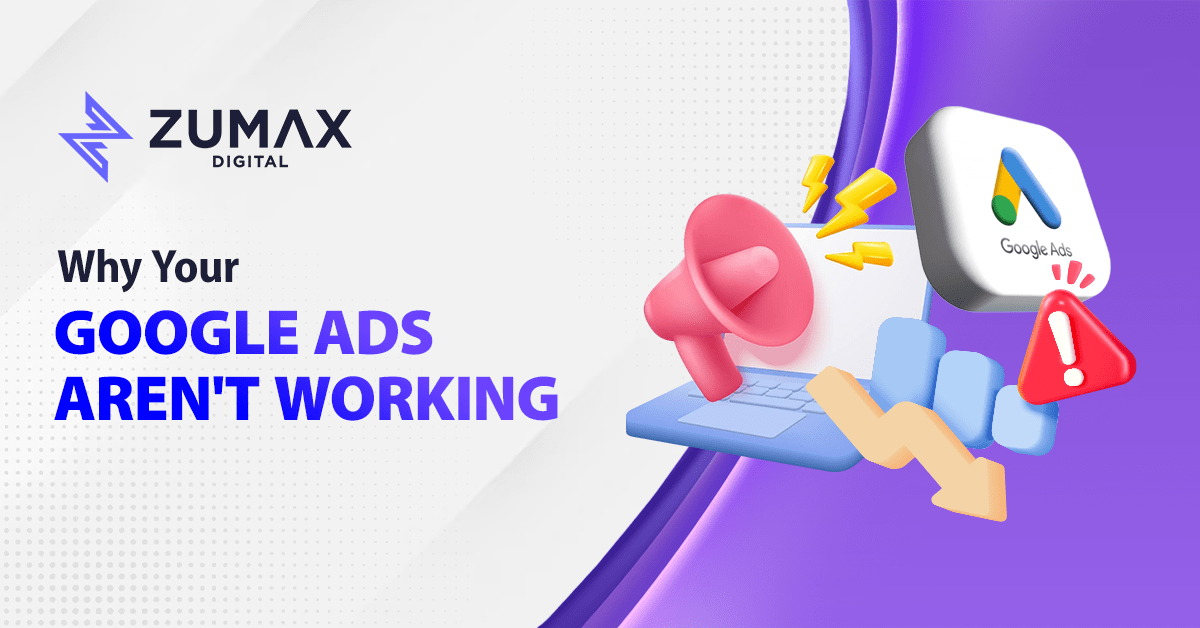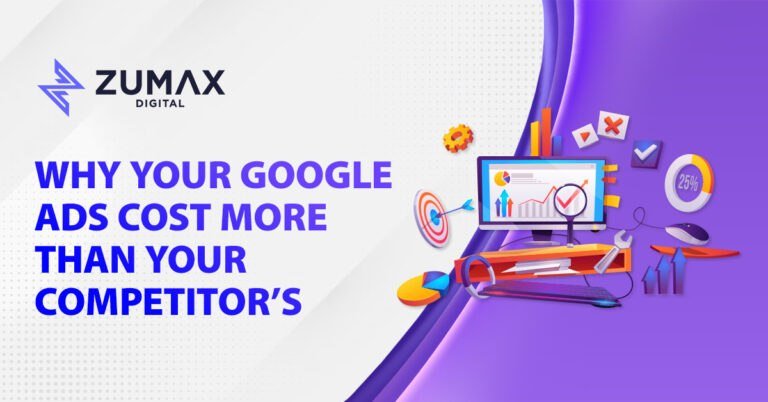
Why Your Google Ads Aren’t Working
Last Updated on June 18, 2025
The Hidden Factors Killing Your Campaign Performance
Running Google Ads can feel like throwing money into a black hole when campaigns consistently underperform. Despite investing significant budgets, many businesses struggle to see meaningful returns from their advertising efforts. The frustration mounts as click costs rise while conversions remain stagnant, leaving business owners questioning whether Google Ads actually work.
The reality is that Google Ads absolutely can deliver exceptional results when executed correctly. However, several critical factors often sabotage campaign performance, and identifying these issues requires expertise that goes beyond basic campaign setup. Understanding why your Google Ads aren’t working is the first step toward transforming underperforming campaigns into profit-generating machines.
Poor Keyword Strategy: The Foundation of Failure
Your keyword strategy forms the backbone of every successful Google Ads campaign. Many businesses make the fatal mistake of targeting overly broad keywords that attract irrelevant traffic while burning through budgets rapidly. Broad match keywords like “marketing services” might seem logical, but they often trigger ads for searches completely unrelated to your offerings.
Effective keyword research involves identifying search terms your ideal customers use. This means diving deep into long-tail keywords that demonstrate clear purchase intent. Instead of targeting “digital marketing“, successful campaigns focus on specific phrases like “digital marketing agency for small businesses” or “local SEO services near me“.
Negative keywords play an equally crucial role in campaign optimisation. Without proper negative keyword lists, your ads appear for irrelevant searches, wasting budget on clicks that never convert. A comprehensive negative keyword strategy prevents your ads from showing for terms like “free,” “cheap,” or industry-unrelated searches.
Targeting the Wrong Audience
Google Ads offers sophisticated targeting options, yet many campaigns cast nets too wide or focus on the wrong demographics entirely. Geographic targeting errors represent one of the most common mistakes—advertising nationally when your business only serves local markets, or conversely, limiting reach too severely when broader targeting could capture valuable prospects.
Demographic targeting requires careful consideration of your ideal customer profile. Age, gender, household income, and interests all influence ad performance significantly. Campaigns targeting “all demographics” typically perform worse than those focusing on specific audience segments that align with buyer personas.
Device targeting also impacts performance dramatically. Mobile users behave differently from desktop users, with mobile searches often having higher local intent. Analysing device performance data reveals whether adjusting bids or creating device-specific campaigns could improve results.

Landing Page Disconnects
Your Google Ads might generate clicks, but if those clicks don’t convert, landing page issues likely sabotage your efforts. The most successful campaigns maintain strong alignment between ad copy and landing page content. When users click an ad promising “30% off SEO services” but land on a generic homepage with no visible discount, bounce rates skyrocket while conversions plummet.
Page loading speed critically affects both ad performance and Quality Score. Google prioritises user experience, and slow-loading pages receive lower Quality Scores, resulting in higher costs per click and reduced ad visibility. Landing pages should load within three seconds on all devices to maintain optimal performance.
Mobile optimisation cannot be overlooked in today’s mobile-first world. Over 60% of Google searches now occur on mobile devices, yet many landing pages provide poor mobile experiences. Responsive design, easily clickable buttons, and streamlined forms are essential for mobile conversion optimisation.
Budget and Bidding Mismanagement
Inadequate budgets often prevent campaigns from gathering sufficient data for optimisation. Many businesses set daily budgets too low to compete effectively in their markets, resulting in limited ad exposure and insufficient conversion data. Without adequate budget allocation, even perfectly optimised campaigns struggle to achieve meaningful results.
Bidding strategy selection significantly impacts campaign performance. Manual bidding offers control but requires constant monitoring and adjustment. Automated bidding strategies like Target CPA or Target ROAS can improve efficiency but need sufficient conversion data to function effectively. Switching between bidding strategies too frequently prevents algorithms from optimising properly.
| Common Budget Mistakes | Impact on Performance | Recommended Solution |
| Daily budget is too low | Limited ad exposure | Increase the budget to capture more qualified traffic |
| Uneven budget distribution | Some campaigns starved for budget | Allocate budget based on campaign performance |
| Ignoring seasonal trends | Missing peak opportunity periods | Adjust budgets for seasonal demand fluctuations |
Quality Score Neglect
Quality Score directly influences ad costs and positioning, yet many advertisers overlook this crucial metric. Low Quality Scores result from poor keyword relevance, weak ad copy, or subpar landing page experiences. Improving Quality Score reduces cost per click while increasing ad visibility—a win-win scenario that many campaigns miss.
Ad relevance depends on tight keyword grouping and specific ad copy. Generic ads that try to appeal to everyone typically achieve lower Quality Scores than targeted ads speaking directly to specific search intents. Creating tightly themed ad groups with highly relevant ad copy improves Quality Score across entire campaigns.
Insufficient Conversion Tracking
Without proper conversion tracking, optimising Google Ads becomes impossible. Many businesses track only basic metrics like clicks and impressions while ignoring actual business outcomes. This blind spot prevents meaningful optimisation and makes it difficult to justify advertising spend.
Conversion tracking should extend beyond online purchases to include phone calls, form submissions, and other valuable actions. Setting up Google Analytics goals, call tracking, and offline conversion imports provides comprehensive performance visibility that drives better optimisation decisions.
The Role of Professional Google Ads Management Services
Managing successful Google Ads campaigns requires expertise across multiple disciplines—keyword research, audience targeting, ad copywriting, landing page optimisation, and data analysis. Many businesses lack the internal resources to execute all these elements effectively, leading to suboptimal performance and wasted advertising spend.
Professional Google Ads management services bring specialised knowledge and dedicated time to campaign optimisation. Experienced Google AdWords marketing services providers understand market dynamics, competitive landscapes, and platform updates that affect campaign performance. They implement advanced strategies like audience layering, attribution modelling, and cross-campaign optimisation that typical business owners might overlook.
A reputable Google advertising company also provides valuable perspective on campaign performance. Internal teams often become too close to campaigns, missing optimisation opportunities that fresh eyes immediately identify. Professional management combines industry best practices with account-specific insights to maximise advertising ROI.

Advanced Optimisation Techniques
Successful Google Ads campaigns employ sophisticated optimisation techniques beyond basic setup. Ad scheduling ensures ads appear when target audiences are most likely to convert. Geographic bid adjustments optimise spending based on location-specific performance data. Audience targeting layers demographic and behavioural data to reach ideal prospects more effectively.
Dynamic remarketing keeps your brand visible to previous website visitors with personalised ad content. This advanced strategy often generates higher conversion rates at lower costs than standard display campaigns. However, proper implementation requires technical expertise and ongoing optimisation to maximise effectiveness.
Transform Your Google Ads Performance Today
If your Google Ads campaigns consistently underperform despite your best efforts, the problem likely stems from one or more of these critical issues. Successful Google Ads management requires continuous optimisation, data analysis, and strategic adjustments that go far beyond initial campaign setup.
Rather than continuing to waste budget on underperforming campaigns, consider partnering with proven experts who can diagnose issues and implement solutions that drive real results. Zumax Digital specialises in transforming struggling Google Ads campaigns into profitable growth engines for businesses across industries. Our comprehensive approach addresses every aspect of campaign optimisation—from keyword strategy and audience targeting to landing page improvements and conversion tracking.
Don’t let another month pass with disappointing Google Ads performance. Contact us today to discover how their expert team can unlock your campaigns’ true potential and finally achieve the ROI you’ve been seeking.








